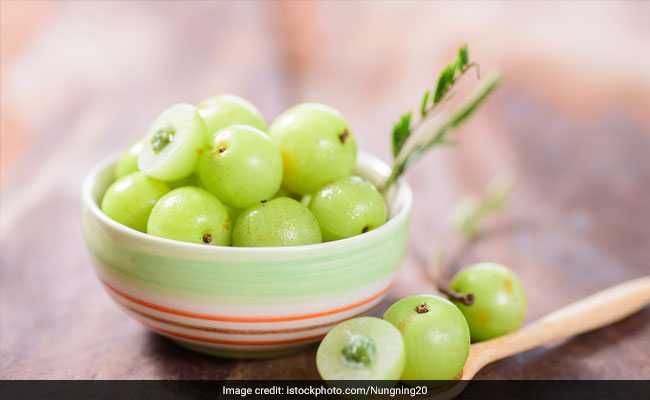
Amla, also known as Indian gooseberry, is one of the fruits that used in many Ayurvedic and traditional medicines. It is known to provide effective treatment to various lifestyle diseases in the ancient Indian medicinal practice of Ayurveda. Amla is believed to be nature's boon to revitalise potency, longevity, increasing immunity and strengthening of bones, and aiding weight loss. Packed with a lot of nutrients, polyphenols, iron, vitamins, and minerals, amla is a winter fruit and is available in almost every part of the country. Hence, it is one such ingredient that has long been hailed for its health benefiting properties. Amla has a slightly bitter taste and can be turned into various cuinary delights.
Apart from the quintessential amla juice or amlachoorna, people across the country have experimented with the bright green, translucent fruit to make pickles, candies, murabbas, chutneys and other condiments. In South India, the fruit is used in preparing dal (lentil preparation) and often added to rice as well.
Amla Nutritional Information
Amla or Indian gooseberry is known for its incredibly rich reserves of ascorbic acid or vitamin C, which is essential for boosting immunity and keeping the body healthy. A single amla can deliver as much vitamin C as two large oranges, making it an superstar among immunity-boosting foods. The Ayurvedic superfood is rich in polyphenols like flavonoids, kaempferol, ellagic acid, and gallic acid, which give it antioxidant properties. Amla is also rich in iron and fibre and is also almost fat-free.
(Also Read: 12 Benefits Of Amla (Indian Gooseberry) For The Hair)

Amla uses: It's used in pickles, chutneys etc.
Since amla is a great source of vitamin C as well as antioxidants known as polyphenols that are believed to combat and protect against cancer causing free radicals. It can also help balance all the three doshas (vata/pitta/kapha) in the body and treat the underlying cause of many health problems. Apart from these, amla is used in making beauty products such as shampoos, hair oils, tonics and wraps, facial scrubs, etc. It is considered great for maintaining lustrous, healthy looking hair as well as a clear and smooth skin.
According to a Delhi-based weight management expert, Gargi Sharma, "there are a number of ways amla can be used to prepare home remedies for curing various conditions such as cold and cough, mouth ulcers, dandruff, constipation and acidity."
Including amla in your daily diet may bring about a significant change in your health and the way you feel. One can include it in a variety of ways, from amla juices or powders to preparing quirky accompaniments out of it.
Here Are 3 Interesting Amla Recipes That You Can Try At Home:
Amla Chutney
Amla along with fennel, brahmi leaves and other spices give you a lip-smacking blend of flavours that will team well with almost anything. You can pair this chutney with chillas to make the culinary experience even more delightful.
Sweet Potato Fries with Amla Aioli
Sweet potatoes are finely sliced, dipped in batter and fried to perfection. This healthy yet delectable amla recipe is sure to impress your taste buds. Serve it with a zingy amla dip and you're done for the day.
Amla Murabba
Sweet can be healthy when it is done with gooseberries! Boiled amla pieces are doused in sugar syrup and flavoured with cardamom. This easy amla recipe is perfect to boost your immunity. Prepare it in the winter months and make the most of it.

Amla benefits: The murabba is perfect to boost immunity and satiate your sweet tooth
Whether you eat it, drink it or simply apply it, amla can do wonders for your hair and the results can be seen so quickly that you wouldn't want to let go of it! Make amla a part of your regular diet.
Disclaimer: This content including advice provides generic information only. It is in no way a substitute for qualified medical opinion. Always consult a specialist or your own doctor for more information. NDTV does not claim responsibility for this information.
Track Latest News Live on NDTV.com and get news updates from India and around the world

